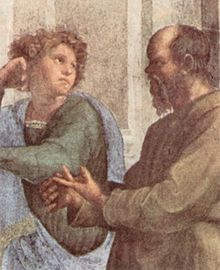Incontinence (philosophy)

Incontinence refers to a lack in moderation or self-control, especially in relation to desire. It is often used to translate the Greek term ἀκρασία (akrasia).
Quotes
[edit]- ἔτι ὁ τῷ πεπεῖσθαι πράττων καὶ διώκων τὰ ἡδέα καὶ προαιρούμενος βελτίων ἂν δόξειεν τοῦ μὴ διὰ λογισμὸν ἀλλὰ δι᾽ ἀκρασίαν: εὐιατότερος γὰρ διὰ τὸ μεταπεισθῆναι ἄν.
- He who on conviction does and pursues and chooses what is pleasant would be thought to be better than one who does so as a result not of calculation but of incontinence; for he is easier to cure since he may be persuaded to change his mind.
- Aristotle, Nicomachean Ethics, 1146a30
- He who on conviction does and pursues and chooses what is pleasant would be thought to be better than one who does so as a result not of calculation but of incontinence; for he is easier to cure since he may be persuaded to change his mind.
- εἴπερ γὰρ ἔστιν ἐφ᾽ ἑνὸς ἀκρασία, ἔστι καὶ ἐπὶ πόλεως.
- There is such a thing as want of self-discipline in a state, as well as in an individual.
- Aristotle, Politics, 1310a19
- There is such a thing as want of self-discipline in a state, as well as in an individual.
- Οὐαὶ ὑμῖν, γραμματεῖς καὶ Φαρισαῖοι ὑποκριταί, ὅτι καθαρίζετε τὸ ἔξωθεν τοῦ ποτηρίου καὶ τῆς παροψίδος, ἔσωθεν δὲ γέμουσιν ἐξ ἁρπαγῆς καὶ ἀκρασίας.
- Woe to you, scribes and Pharisees, hypocrites! For you clean the outside of the cup and the plate, but inside they are full of greed and self-indulgence.
- δουλείαν δὲ ποίαν κακίστην νομίζεις εἶναι; ἐγὼ μέν, ἔφη, τὴν παρὰ τοῖς κακίστοις δεσπόταις. τὴν κακίστην ἄρα δουλείαν οἱ ἀκρατεῖς δουλεύουσιν;
"What sort of slavery do you believe to be the worst?”
“Slavery to the worst masters, I think.”
“The worst slavery, therefore, is the slavery endured by the incontinent?”
- Xenophon, Socrates and Euthydemus in Memorabilia, 4.5
- σοφίαν δὲ τὸ μέγιστον ἀγαθὸν οὐ δοκεῖ σοι ἀπείργουσα τῶν ἀνθρώπων ἡ ἀκρασία εἰς τοὐναντίον αὐτοὺς ἐμβάλλειν; ἢ οὐ δοκεῖ σοι προσέχειν τε τοῖς ὠφελοῦσι καὶ καταμανθάνειν αὐτὰ κωλύειν, ἀφέλκουσα ἐπὶ τὰ ἡδέα, καὶ πολλάκις αἰσθανομένους τῶν ἀγαθῶν τε καὶ τῶν κακῶν ἐκπλήξασα ποιεῖν τὸ χεῖρον ἀντὶ τοῦ βελτίονος αἱρεῖσθαι;
- As for Wisdom, the greatest blessing, does not incontinence exclude it and drive men to the opposite? Or don't you think that incontinence prevents them from attending to useful things and understanding them, by drawing them away to things pleasant, and often so stuns their perception of good and evil that they choose the worse instead of the better?
- Xenophon, Socrates in Memorabilia, 4.5
- As for Wisdom, the greatest blessing, does not incontinence exclude it and drive men to the opposite? Or don't you think that incontinence prevents them from attending to useful things and understanding them, by drawing them away to things pleasant, and often so stuns their perception of good and evil that they choose the worse instead of the better?
"Has it ever occurred to you, Euthydemus, ... that though pleasure is the one and only goal to which incontinence is thought to lead men, she herself cannot bring them to it, whereas nothing produces pleasure so surely as self-control?”
“How so?”
"Incontinence will not let them endure hunger or thirst or desire or lack of sleep, which are the sole causes of pleasure in eating and drinking and sexual indulgence, and in resting and sleeping, after a time of waiting and resistance until the moment comes when these will give the greatest possible satisfaction; and thus she prevents them from experiencing any pleasure worthy to be mentioned in the most elementary and recurrent forms of enjoyment. But self-control alone causes them to endure the sufferings I have named, and therefore she alone causes them to experience any pleasure worth mentioning in such enjoyments."
- Xenophon, Socrates and Euthydemus in Memorabilia, 4.5
See also
[edit]- Intemperance
- Moderation
- Pleasure
- Self-control
- Self discipline
- Self-realization
- Temperance
- Vices
- Virtues


